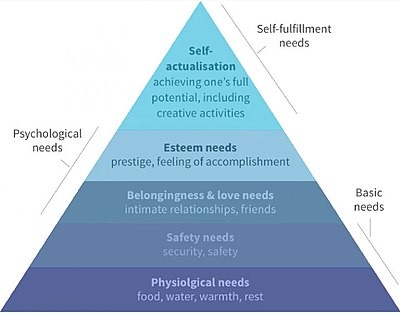In a mere matter of months, lawyers found themselves moving from reconciling their Psychological needs to distressing about meeting their most Basic needs
Almost everyone has heard of Abraham Maslow’s Need Hierarchy. It is a universal system of human striving, depicted as a pyramid with basic needs leading upward to psychological needs before reaching transcendent self-fulfillment.
It’s a vital prism for refracting human experience that has stood the test of time. And it’s well known because it’s true.

And Maslow’s Need Hierarchy also reminds us that although we may have scaled the side, we can just as easily slide down it.
Just a few months ago, America was seeing record low unemployment and record high stock markets. In the legal market, law firms were seeing signs of sustained success, driven by continued growth in rates and key practices like litigation. Basic needs — physiological and safety — were givens. The vast majority of Americans were looking for love and confidence (Psychological needs) while a lucky few were actualizing (Self-fulfillment needs).
Clang. Crash. Crack. COVID-19.
In a mere matter of months, 330 million Americans went from reconciling their Psychological needs or realizing their Self-fulfillment needs to distressing about their Basic needs. Law firms quickly found themselves weighing furloughs, pay reductions, and even layoffs.
Collectively, we tumbled down the steep slope. We were back to the basics.
Even today, almost eight months into the pandemic, people are scared. The business word for scared is stressed; and research shows that highly stressed people perform poorly in almost every category. In response to acute stress, our bodies’ sympathetic nervous system activates glands that release a host of toxic chemicals that ignite our responses to fight or flee. When we’re scared, we’re not in the past, present, or future — we’re not thinking, wondering, or creating. We are instead blinded by bio-chemistry where anxiety, uncertainty, and fear reign.
For lawyers, this has only been heightened. Lawyers already live in a high-stress world, often sleep-deprived, driven by firm expectations of high billable hours contrasted by client demands for cost savings. The legal industry itself has been experiencing unprecedented change that’s being driven by client preferences and rapid advancements in technology. However, at least up until the pandemic, lawyers could rest fairly well assured that while the long-term future was uncertain, their present was relatively sound and lucrative. The pandemic shattered that.
Meeting psychological needs during the pandemic
So how can legal leaders create a sense safety? Organizational schemes like furloughs (in lieu of layoffs) and extended healthcare are all well and good, but there’s something more fundamental, more essential, and more atavistic needed. And, fortunately, it’s also more readily available: Reassurance.
Reassurance alleviates fear and restores safety. It sounds simple, just as Maslow’s hierarchy looks simple; when we’re scared, however, what we most desire is to have our brows stroked while being closely held and told, “It will be okay.” Nothing alleviates fear more than that. Nothing makes us feel safer.
In the business world, that kind of behavior would justifiably give rise to human resources complaints — but think of it metaphorically. A leader does not have to physically embrace an employee to convey a sense of safety and security; instead, the choices a leader makes can convey that feeling of safety. Leading in a crisis is largely the same as leading any other time, but with an eye toward the current reality.
Some important concepts for leaders to keep in mind during this time, include:
-
-
- Remember, all eyes are on you — As a leader, you are in the spotlight. Recognize that now, perhaps more than at any other time, the people you lead are looking to you.
- Stay positive — Leaders can project an air of confidence and positivity, but this must always be tempered with a healthy dose of realism.
- Be truthful — Just as a leader should stay positive, they must also be honest. Lawyers in particular are adept at seeing through falsehoods. But they also appreciate candor.
- Align expectations — Humans, and especially lawyers, have a desire for standards and justice. They want to know the standards by which they will be judged, and that those standards will be applied equitably. That does not just mean treating similarly situated people the same; it means recognizing reality and adjusting expectations accordingly.
- Say what you stand for — This is nothing new in a crisis. The people you lead want to know where you stand, and want to be assured that you will act with integrity.
- Be empathetic — Show the people you lead that you not only have expectations of them, but you also care for Today’s society is replete with reminders that “We’re all in this together.” So, remind the people you lead that means your team as well.
- Focus on the future —People are anxious to look beyond the problems of today. Provide them with a vision of what the future can hold for them. And remember, be positive and truthful.
- Slow down and stay calm — Attitude reflects leadership. If you, as a leader, are seen as harried, your team will pick up on that.
- Have a plan — This can be particularly challenging given how uncertain things are these days. However, you should strive to provide predictability where you can, on both a macro- and a micro-level.
- Just lead.
-
The COVID-19 pandemic will be remembered, above all things, as a failure of leadership to make us feel safe. Months of frightening statistics, blunted facts, and queasy projections have subjected the human psyche to an incredible degree of strain. The teams within law firms have felt that societal strain, amplified by the uncertainty surrounding the legal profession.
However, as a law firm leader, you can help lead your teams and your firm through it. Think of Maslow’s pyramid, and help your team keep moving toward the top.
This article was written by James Bailey, Ph.D., a Professor of Management and Hochberg Fellow of Leadership Development at the George Washington University School of Business. This piece is adapted from a presentation to the George Washington University Masters in Professional Studies Law Firm Management alumni cohort for the True Value Partnering Institute.






